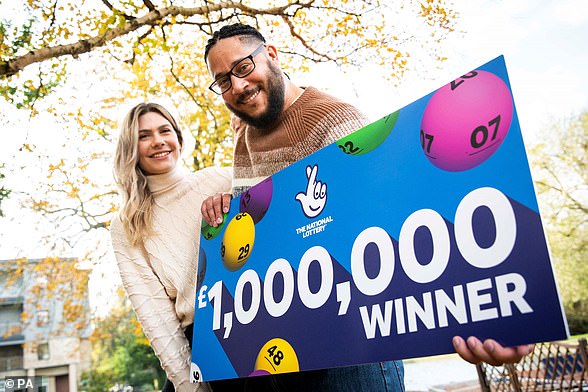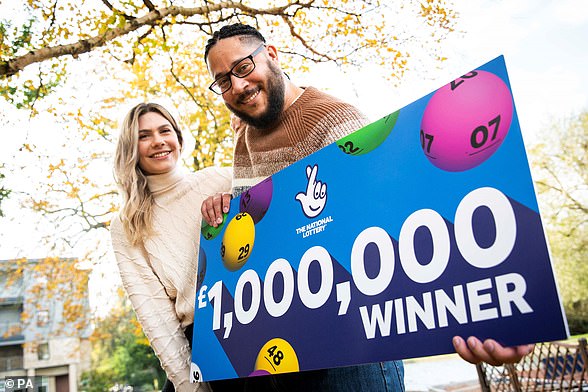A Czech billionaire’s gambling firm will take over the UK’s National Lottery, it has been confirmed, bringing an end to Camelot’s 30-year hold of the licence after months of legal wrangling.
The Gambling Commission announced on Tuesday that Allwyn Entertainment, which runs lotteries in Austria, the Czech Republic and Greece, will gain the latest National Lottery licence from February 2024.
The firm, previously known as Sazka before it rebranded with an anglicised name during the bidding process, has pledged to double charitable donations to £38billion over the next decade and to slash ticket prices to £1.
But its owner, oil tycoon Karel Komarek, 53, has previously faced scrutiny over his links with Russian-state energy giant Gazprom, which is controlled by the Kremlin.
His company MND (Moravske Naftove Doly) formed a joint venture with Gazprom to build an underground gas storage facility in his home country, which opened in Moravia in 2016.
For several years, MND also held a stake in a Czech gas importer that is majority-owned by subsidiaries of Gazprom, although it no longer does so.
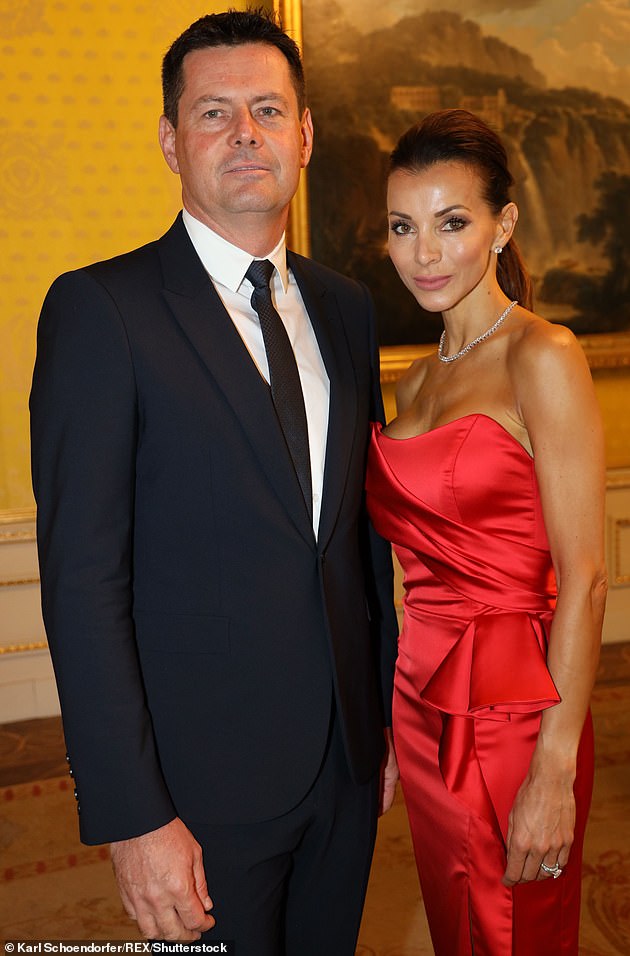
Czech businessman Karel Komarek, 53, (pictured with wife Stepanka) is set to take over the highly lucrative National Lottery licence with a plan to slash ticket prices from £2 to £1
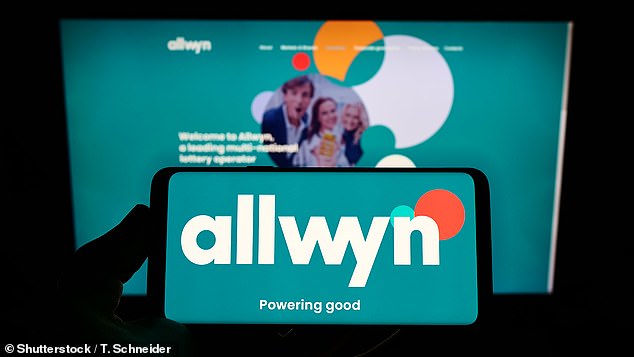
Formerly known as Sazka, Allwyn is Europe’s largest operator and has fended off three competitors to operate the UK lottery draw after battling with the Canadian-owned Camelot, Italy’s Sisal and media tycoon Richard Desmond
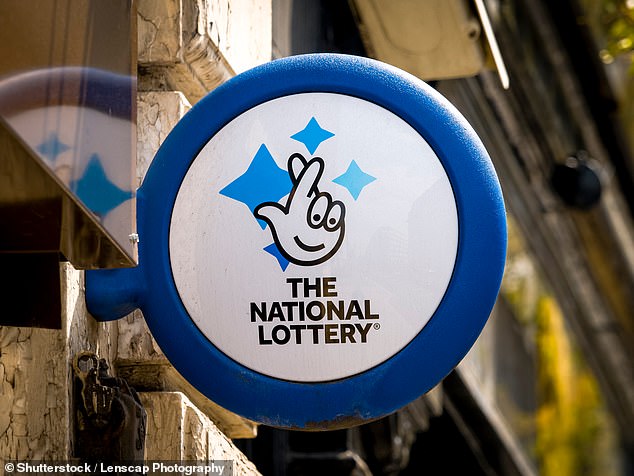
The National Lottery has been operated by Camelot Group since the first draw in November 1994, however the Gambling Commission went to High Court so Allwyn Entertainment could sign a 10-year licence to run the lottery
Mr Komarek celebrated in March when Britain’s Gambling Commission first announced that it would hand the licence to Allwyn, ditching Canadian-owned Camelot, which has run the lottery since it began in 1994.
But Camelot launched legal proceedings a month later, claiming the commission got the decision ‘badly wrong’.
The commission asked the High Court to overturn the automatic stay-put order on the handover due to the legal case, warning of the disruption it could cause to the lottery.
In late June, the court agreed to lift the suspension preventing it from beginning the licence transfer, but this was then appealed by Camelot.
However, earlier this month, Camelot and rival IGT confirmed they had dropped their action through the Court of Appeal.
The Gambling Commission said it can therefore now ‘commence the transaction’.
‘We are pleased to have officially awarded the fourth licence to Allwyn following a highly successful competition and the court’s decision to lift the suspension on the award process,’ commented Andrew Rhodes, chief executive officer of the Gambling Commission.
‘We now look forward to working with all parties to ensure a smooth and efficient handover.’
Allwyn has said it hopes to more-than-double the amount of money allocated for good causes after confirmation it has officially been awarded the next National Lottery licence.
Justin King, chairman of Allwyn, said: ‘Today’s award formally marks a fresh start for the National Lottery.
‘We have exciting plans for this important and cherished institution, crucially raising even more proceeds for good causes across the country, improving the player experience through the latest technology and ensuring safe participation.
‘Everyone at Allwyn is ready to meet the challenge of working under a shortened timeframe for transition.
‘We look forward to working closely with Camelot’s team over the coming months to ensure the lottery is in its best ever shape when we take the reins in February 2024.’
Allwyn boss Mr Komarek, who is worth £5.9billion according to Forbes, started his business in the 1990s in the oil and gas sector.
He moved into lotteries a decade ago when he bought the firm that runs draws in the Czech Republic.
The Gambling Commission said it was ‘satisfied that no application is impacted by sanctions related to the conflict in Ukraine’.
And in an open letter in March this year, Mr Komarek condemned Russia’s ongoing invasion of Ukraine and said he was discussing the removal of Gazprom from the joint venture.
Camelot has operated the National Lottery since its launch in 1994, and took over the nation’s screens with televised draws hosted by the likes of Dale Winton, Anthea Turner and John Cleese.
The company fought off seven competing bidders to win the first contract and, within 24 weeks, had placed terminals in 10,000 retailers.
The televised lottery draw had a peak audience of more than 20 million for the first ever result in 1994 presented by Noel Edmonds.
However, at the end of the first licence period in 2001, the novelty had begun to wear off within the public.
Controversy also emerged four years earlier when it was revealed three senior Camelot officials had been awarded six-figure bonus payments.
Bidding for the third term resulted in a High Court fight, led by Camelot, after the licence was initially handed over to Richard Branson’s People’s Lottery.
Camelot won the bid for a third term in 2007, when it fought off competition from Indian lottery group Sugal & Damani – the only other company to make a bid.
The Gambling Commission then awarded Camelot a ten-year licence to run the National Lottery from 2009, before this was extended by a further four years in March 2012.
But after more than 20 years of running the lottery, Camelot has lost out to Komarek’s Czech lottery operator Allwyn.
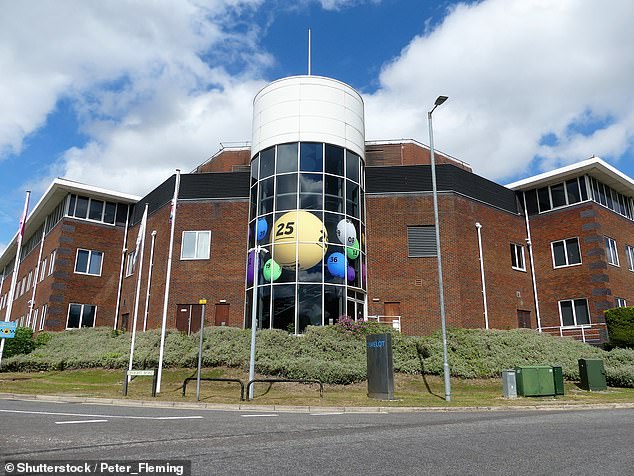
Hertfordshire-based Camelot (headquarters above) filed a High Court claim against the Gambling Commission in March, in an effort to retain its UK bidding rights. That bid failed.
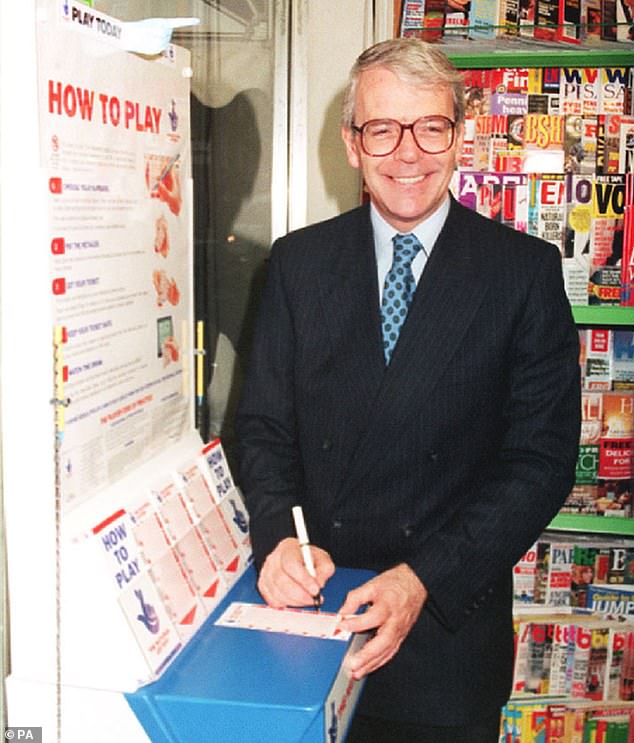
When Prime Minister John Major launched ticket sales for a new National Lottery in November 1994, he said Britain would be ‘a lot richer because of the lottery.’ Pictured, Major choosing his numbers for the National Lottery at a newsagents in Victoria in November 1994
The group is said to have spent £9million on its bid to become the next lottery operator, and even appointed double Olympic-gold winner Lord Sebastian Coe, president of World Athletics, to its board.
It also counted Sir Keith Mills, a close ally of Boris Johnson and deputy chairman of the 2012 London Olympics, among its contingent.
Justin King, a former Sainsbury’s chief exectuive, Brent Hoberman, founder of Lastminute.com, and Charles Garland, the music producer who helped launch the careers of S Club 7 and hugely successful TV hit, The X Factor, were also key to Allwyn’s successful bid.
The Gambling Commission said Allwyn had committed to invest in the National Lottery to deliver growth and innovation across the various products and channels and increasing contributions to good causes.
As part of its bid Allwyn pledged to donate £38 billion to good causes over the next decade, almost equivalent to the £45 billion Camelot raised since it began running the national lottery in 1994.
